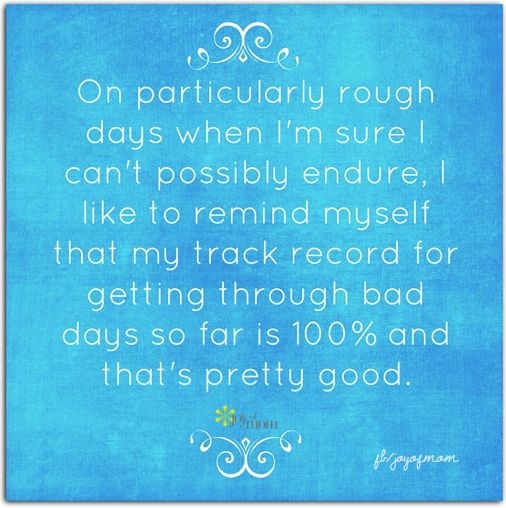Self-Care! Caring For the Caregiver
I try to remember that, "If Mama ain't happy, ain't nobody happy!" I do everything I can to refill my "bucket." Even knowing that your child (who might feel abandoned) is going to “punish” you later, remember that it’s worth it. Your child may not be able to handle you leaving, but your whole family benefits from you getting this needed recharge. You can't help anyone if you have an empty tank.
Please do whatever you can to take care of yourself and your needs. It must be a priority.
But what if you just can't go anywhere! You're at the end of your rope and you're completely drained.
You have got to find some respite somewhere, in some way.
Respite
Some thoughts:
Sanity Breaks
What about a staycation? Prepare a couple of meals in advance (or just make sure you have cereal or sandwich fixin's for the kids), tell the kids you are on strike and they are on their own, then lock yourself in your room - well-stocked with your favorite beverages and snacks, Read a book, do some crafts, take a bubble bath, watch a non-Disney movie, have a friend or two over for a sleepover or "girls night in"...
Are your kids old enough to be left alone for a little while? Even if you know they will get into trouble, as long as there's little chance of permanent damage, maybe you should just get away for a while - even a couple of hours doing something just for yourself.
TV - I've been known to rent or even purchase a bunch of kid movies or a marathon on TV of a favorite show or movie series that I know my kids want to watch and plop them down in front of it with pizza and/or snacks.
Keep them busy! Things your children can do to keep them occupied.
Activities for Kids
Activities to Keep Older Kids/Adults Busy
Keep them busy! Things your children can do to keep them occupied.
Activities for Kids
Activities to Keep Older Kids/Adults Busy
Informal Respite
Will your kids behave for other people?
Will your kids behave for other people?
- Co-op (you watch my kids one time and I'll watch them the next).
- Babysitting by a fellow trauma mama or trained respite worker.
- Babysitting by a teenager who is experienced with kids with special needs (maybe a sibling of kids of trauma)
- Friends and family willing to learn how to provide care to "our kids"
- Playdates/ sleepovers with classmates, the children of family friends...
Daycare/ Mother's day out programs/ after-school care - even if you're a stay at home mom.
Gym a lot of gyms and YMCAs offer childcare while you work out (which is good self-care!).
Volunteer work. When our kids were too old for summer camp and after-school care. We found programs that offered highly structured volunteer programs. We found several equine therapy places that had volunteer programs.
Extra-curricular programs (gymnastics, equine therapy, sports...) or therapy (like equine therapy). Even if you can't go far while your child is doing the activity, you can still do something just for you. I've sat in my car and read magazines.
Semi-formal Respite
Are they adopted from foster care? If yes, there might be some respite funding in post-adopt services.
Local foster care agencies. Even if it's not the place from which you adopted your child.
- Contact local foster/adopt agencies and see if they have parents trained in therapeutic parenting that will provide respite
Local parent support groups. Do you live close enough to somewhere that has support groups? A chance to meet other trauma mamas and build a support network. Some support groups offer free childcare even if it's only during support group meetings.
- NACAC (North American Council on Adoptable Children) - Find a local parent group. https://www.nacac.org/connect/parent-group/
- NACAC - Find a local adoption support group. https://www.nacac.org/connect/find-local-adoption-support/
Churches. Even if you don't regularly go to church, there might be a church in your area that can help. Usually, there are classes for the kids separate from the parents, some of the larger churches even have special needs classes where people who "get it" take care of your kids, if just for an hour. Our church has an "angel" program, where an adult or teen follows around a special needs child one on one.
Formal Respite
Post about Interview Questions for Caregivers or Respite Workers.
Care.com and other professional childcare and respite care agencies. May have caregivers experienced in working with special needs, sometimes former foster parents, people who've worked in residential treatment centers, or special education teachers
College Students - Place an ad at the local college/university. Many students, especially special ed teachers, psychology majors, child development majors... are looking for jobs. This might be babysitting, after-school care, respite...
Formal Respite
Post about Interview Questions for Caregivers or Respite Workers.
Care.com and other professional childcare and respite care agencies. May have caregivers experienced in working with special needs, sometimes former foster parents, people who've worked in residential treatment centers, or special education teachers
College Students - Place an ad at the local college/university. Many students, especially special ed teachers, psychology majors, child development majors... are looking for jobs. This might be babysitting, after-school care, respite...
ARCH National Respite Network and Resource Center has a National Respite Locator that helps parents, family caregivers, and professionals find respite services in their state and local area to match their specific needs.
Respite Funding
- Search for Respite Funding
- Title XX of the Social Security Act provides for funding for social services through the Social Services Block Grant (SSBG). States have substantial discretion in the use of SSBG funds. Each State determines what services are provided, who is eligible to receive them, and how funds are used. This might provide childcare funding (Tip: If the amount you qualify for is too low, the doctor can fill out the DHHS form “The Documentation of Special Needs for Child Care” to request a higher child care rate).
- Lifespan Respite Care Program - Lifespan Respite Care is not one specific program, but rather it is a federal act authorized by Congress that provides grants to the individual states. It is funded by the U.S. Department of Health and Human Services’ Administration for Community Living. Through 2018, there have been nine rounds of grants to establish Lifespan Respite Care Programs in 37 states, as well as the District of Columbia. The exact services and procedures are specific to the individual state, though all programs share certain components. The grants are intended to improve access to respite care, and to that end, each state strives to raise awareness that respite care services exist through public messaging and by offering a database of local respite care service providers. This allows individuals to search for providers and sort the results to meet their eligibility criteria.
There are a few organizations out there that hold trauma mama retreats, but travel can be expensive and it can be super scary to hang out with a bunch of people you've never met before. The biggest issue of all is that when you need the support the most is when it's the hardest to get away!
I can tell you right now, that retreats are worth it! If you can possibly find a way to make it happen, DO IT!
Retreats can be big and super organized, or just 3 or 4 mamas hanging out.
- ACT Seminar 2009 and 2010 - road trip! Nothing like hanging out with trauma mamas for hours on the road and experiencing a powerful seminar.
- Texas Trauma Mama Retreat 2012 - about 10 women, hanging out in a beach house.
- BeTA Retreat 2014 - over 100 women from all over the world staying in a string of villas in Florida. There were lots of (optional!) things to do: trainings/presentations, a catered meal with a comedienne for entertainment, trips to the local tattoo parlor, masseuses and mani/pedis, "block parties" with donated goodies... even a fun run). Each villa had a pool and hot tub and you could hang out with just the people in your villa or visit other villas.
- Unshaken Moms Retreat 2015 - about 20 women staying in a gorgeous bed and breakfast in the middle of nowhere.
- Trauma Mama mini-retreats - a few trauma mamas hanging out in a hotel for one night. Sometimes a trauma mama will be visiting a city near me for an event and we'll gather together for a night and just hang out. We might sightsee, paint the town red, or just hang out and talk all night.
- Trauma Mama Playdates - 2-4 trauma mamas getting together to talk. We might go to lunch or dinner or just hang out at the park or someone's house. Kids are optional - whatever works.

Want to go to a retreat, but can't find one near you? Organize one yourself (or talk your friends into helping you!)!!
Retreats don't have to be expensive, but be sure you don't over commit yourself. Do get deposits from everyone who is attending. You don't want to end up stuck with a bill for a big house with empty beds. Personally, I don't care where I sleep or what we do, for me it's about who I'm with. I'd be perfectly happy sleeping on an upholstered chair in a cheap motel, drinking boxed wine and eating PB&Js, as long as I had a chance to connect with my fellow trauma mamas.
 |
| Henna Tattoo |
Don't be afraid to ask for donations - it's a good cause! I recently went to a weekend retreat at a gorgeous B&B with amazing food, all for only $50! The location was donated by the sister of trauma mama (the place wasn't booked for that weekend, and she felt the trauma mamas were a good cause).
Food can be potluck, brought in by local trauma mamas, donated by local shops, or shopped for in bulk. The main thing to remember is to have LOTS of CHOCOLATE! Many people and places will donate goods or services. One of the retreats I have been to has a woman who spends the whole weekend doing henna tattoos on everyone.
Food can be potluck, brought in by local trauma mamas, donated by local shops, or shopped for in bulk. The main thing to remember is to have LOTS of CHOCOLATE! Many people and places will donate goods or services. One of the retreats I have been to has a woman who spends the whole weekend doing henna tattoos on everyone.
 |
| Yes, I dressed as Wonder Woman the whole time. Got a problem with that? |
Hope Rising was a great organization that connected Trauma Mamas to each other primarily through FaceBook. They organized retreats at central locations all across the country. Unfortunately, they are no longer operating as an organization, but they have left behind a great document for organizing your own retreat.





















